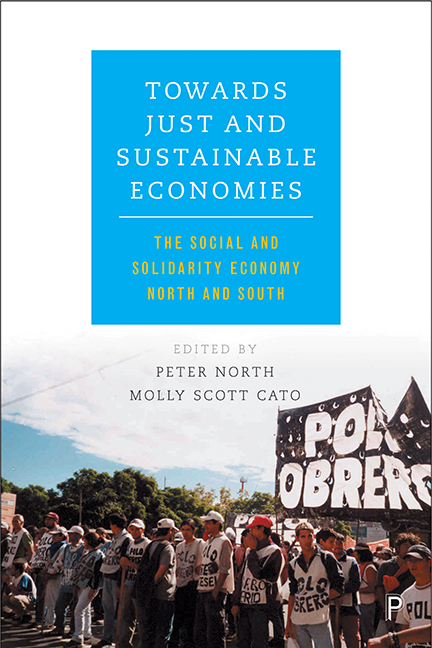Book contents
- Frontmatter
- Dedication
- Contents
- List of figures and tables
- Notes on contributors
- Acknowledgements
- One Introduction: new economies North and South – sharing the transition to a just and sustainable future
- Part I Theoretical perspectives on the social and solidarity economy
- Part II The social and solidarity economy as a site of social innovation
- Part III The social and solidarity economy and the state
- Part IV Policy translation between North and South
- Index
Seven - Brazil’s social economic incubators
Published online by Cambridge University Press: 05 April 2022
- Frontmatter
- Dedication
- Contents
- List of figures and tables
- Notes on contributors
- Acknowledgements
- One Introduction: new economies North and South – sharing the transition to a just and sustainable future
- Part I Theoretical perspectives on the social and solidarity economy
- Part II The social and solidarity economy as a site of social innovation
- Part III The social and solidarity economy and the state
- Part IV Policy translation between North and South
- Index
Summary
Introduction: the Brazilian solidarity economy
The solidarity economy movement emerged in the 1980s during the struggle for re-democratisation of the country in response to the government's neoliberal economic plan guided by the Washington Consensus. Neoliberalism in Brazil was characterised by the restructuring of the world of work, the reconfiguration of the international process of capital accumulation, an extraordinary increase in foreign debt, economic stagnation and growing unemployment. In this context, many companies were bankrupted, and their workers became unemployed. Brazilian workers reacted to this crisis by recovering insolvent factories and creating productive organisations based on self-management, first as an alternative to unemployment, and later as part of a wider economic, political and social movement known as the ‘solidarity economy’, which amplified calls for democracy to be transmitted from the political to the economic sphere. For Cruz (2006, p 58), the term solidarity economy is a disputed concept. He argues that:
those advocating the use of the expression do not coincide with its meaning, and those criticising it, obviously do not coincide with their criticism, either.… One of the landmarks of this contextualisation was [the work of] Chilean sociologist Luis Razeto (1982) entitled Empresas de Trabajadores y Mercado Democrático, in which the terms the economy of solidary/solidarity economy is presumed to have first emerged in Latin America.
The solidarity economy that has emerged in Brazil represents an upsurge of political and social contestation against neoliberalism. It is composed of different political, social and religious streams, such as liberation theology, adopted by the progressive wing of the Catholic Church in the 1980s and its ecclesiastical base communities; Cáritas Brasileira and its alternative community projects; the Landless Workers’ Movement (Movimento dos Trabalhadores Sem Terra, or MST); and the Pastoral Land Commission created in 1975 during a pastoral meeting of the Amazonian Catholic Church.
A number of associations emerged during this upsurge such as the Brazilian Association of Solidarity Cooperatives, which today includes the Brazilian Confederation of Agrarian Reform Cooperatives, created in 1992, which gathered cooperatives and associations of rural workers settled by agrarian reform in Brazil; the Brazilian Association of Family Agriculture and Solidarity Economy Cooperatives; and the Union of Cooperatives and Solidarity Ventures.
- Type
- Chapter
- Information
- Towards Just and Sustainable EconomiesThe Social and Solidarity Economy North and South, pp. 117 - 134Publisher: Bristol University PressPrint publication year: 2017
- 1
- Cited by

